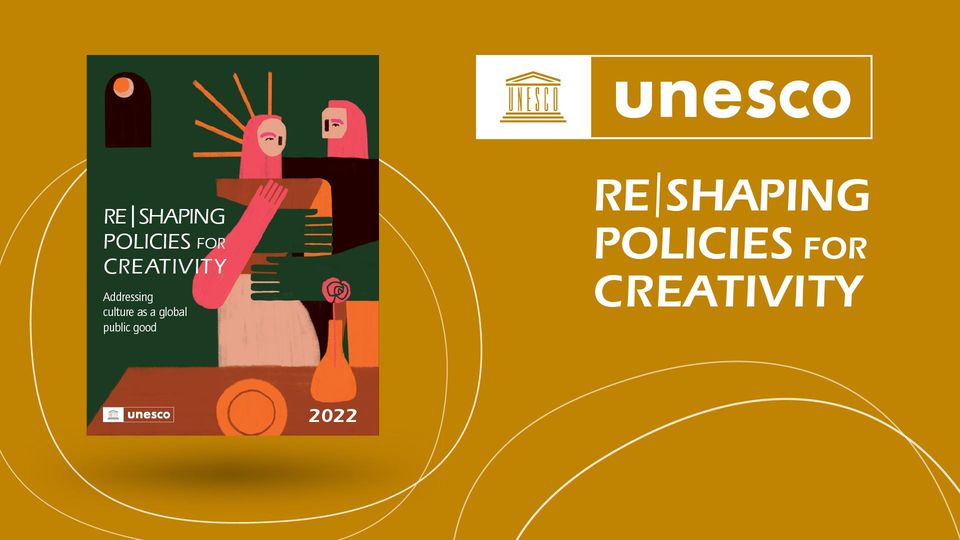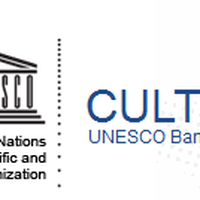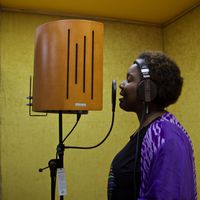UNESCO Global Report Re|Shaping Policies for Creativity

The UNESCO flagship publication, Re|Shaping Policies for Creativity – Addressing culture as a global public good, is launched online on 8 February 2022. The report offers new data and policy recommendations to foster creative ecosystems for a sustainable world by 2030 and beyond.
The UNESCO Global Report, Re|Shaping Policies for Creativity – Addressing culture as a global public good, is the third edition of a series designed to monitor the implementation of the 2005 Convention on the Protection and Promotion of the Diversity of Cultural Expressions. As the only Report of its kind, it provides a global overview of the state of the cultural and creative sectors, through insightful new data that shed light on emerging trends at a global level and puts forward policy recommendations to foster creative ecosystems that contribute to a sustainable world by 2030 and beyond.
IFACCA (International Federation of Arts Councils and Culture Agencies) reflection on the Global Report:
On 8 February 2022, UNESCO launched its Global Report, Re|Shaping Policies for Creativity – Addressing culture as a global public good, the third edition in a series designed to monitor the implementation of the 2005 Convention on the Protection and Promotion of the Diversity of Cultural Expressions, which has now been ratified by 150 countries and the European Union. This important global overview of trends and gaps comes at a crucial juncture for the cultural and creative sectors (CCSs), which were facing testing times even before the challenges brought on by global COVID-19 crisis. The Report reminds us that - except in a few cases - public investment in culture had, in fact, been steadily decreasing over the last decade. The CCSs are now among the hardest hit by the pandemic, with over 10 million jobs lost in 2020 alone.
To address the growing challenges of the CCSs and reaffirm their key role in the resilience and regeneration of economies and societies, the Report seeks to establish culture as a global public good which needs to be fully protected and promoted for the benefit of humanity as a whole. At IFACCA, this belief that arts and culture are a public good - with the potential to further inclusive social transformation - to be shaped and accessed equitably by all peoples, has always been central to our guiding principles.
In championing culture as a public good, the Report contributes to a much-needed wider understanding that policies to support culture and creativity may be made not only in the form of cultural policies but in other fields that drive societal transformations (such as policies for sustainable and inclusive economic growth, decent employment opportunities, gender equality, social inclusion and mitigating climate change). In this context, the Report strongly recommends the whole-of-government approach to cultural policy, which appears to be only progressing slowly, mainly due to limited cross-portfolio and cross-agency collaboration.
Two findings of the Global Report particularly stand out for us at IFACCA as they dovetail with our Strategy 2021-2026 - written in the post-COVID-19 context - that outlines how we aspire to work with our members to adapt to post-COVID conditions, through crisis management, recovery and long-term strategy; rebuild, redefine and reform public support for arts and culture, towards a more sustainable and secure future, while also demonstrating the international leadership and innovation potential of the CCSs and embedding arts and culture in wider social conversations and collaborating with other sectors.
The first is that that the lowest number of measures have been reported by State Parties to the 2005 Convention under the heading of the promotion of human rights and fundamental freedoms. This has clear and immediate consequences for safeguarding artistic freedom, which is the theme of the 9th World Summit on Arts and Culture. The Report discovers a worrying disconnect between protective law and practice, as attacks on freedom of artistic expression continue to rise globally, ranging from censorship to death threats. The upcoming Discussion Paper of the 9th World Summit on Arts and Culture will directly respond to these complex issues.
The second finding of the Global Report that particularly resonates with us in these fragile and uncertain times concerns the working conditions in the CCSs. The Report sombrely concludes that equal economic and social protection among cultural workers, regardless of their gender, may not yet be fully understood as a prerequisite for nurturing and maintaining the diversity of cultural expressions. This is a key concern for the federation, and we will be doing more work in this space in 2022.
Follow the live launch event on 8 February 2022 from 2-4pm (CET) on:
YouTube | Facebook | UNESCO Webcast
The report is produced with the support of The Government of Sweden and the Swedish International Development Cooperation Agency (Sida)
Ten million jobs in creative industries worldwide were lost in 2020 as a result of the Covid pandemic, and the increasing digitisation of cultural output means it is harder than ever for artists to make a living, a Unesco report has said.
Covid has led to “an unprecedented crisis in the cultural sector”, said Audrey Azoulay, the director-general of Unesco, the UN’s cultural body, in a foreword to the report. “All over the world, museums, cinemas, theatres and concert halls – places of creation and sharing – have closed their doors …
“What was already a precarious situation for many artists has become unsustainable, threatening creative diversity.”
Although the cultural and creative sector is one of the fastest growing economic sectors in the world, it is also one of the most vulnerable and is often overlooked by public and private investment, said the 328-page report, Reshaping Policies for Creativity.
Government spending on creative industries was declining in the years preceding the pandemic, and Covid led to a collapse in income and employment.
Similar content
posted on
21 May 2020
deadline
15 Jun 2022
from - to
27 Nov 2018 - 28 Nov 2018
posted on
27 Mar 2014
posted on
07 Aug 2018
deadline
16 Jun 2021






